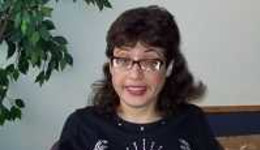Lia M


Instruments: Piano, Voice, Organ, Synthesizer, Keyboard
Styles: Classical, Pop, Rock, Gospel, Opera, Spirituals


Lia M

Instruments: Piano, Voice, Organ, Synthesizer, Keyboard
Styles:
Classical, Pop, Rock, Gospel, Opera, Spirituals
Where I Teach:
Ages Taught: 10-80
BA, California State University, Fresno: Music, Option II, Performance
December, 1998: Senior Recital, Soprano Voice
I must have started out in music when I was 4, and it was then that my love for the art grew as time went on. I started my piano lessons at 7 1/2, but I eventually decided the voice was more my thing, and I continued with that in choir and in solo vice by the time I was in junior high. Over the years, I have improved my skills, and I made my way to Fresno State University in 1996, where the competition was much tougher, and there was so much more to learn. I graduated in the Fall of 1998. Since then, I have toyed with organ and electronic keyboard as I started following more of the classic rock and pop styles of the 70's and 80's. Although my classical training taught me a great deal, it has helped me learn more about rock and pop in general, plus it helps me find what' lacking in today's music. with the skills I have within and outside of Fresno State, I want to impart what I have learned on others, so that they too can become more well-rounded as musicians.
I started teaching piano in other people's homes soon after I became a student at College of the Sequoias in Visalia, CA. Since I sang mostly at church, people asked me if their children could learn more about music from someone who has worked on it for a long time. By the time I went to Fresno State, I wasn't able to teach nearly as much, and probably needed teaching, myself! The experience of voice lessons made me quite humble, and it made me a much more rounded person in my art. As of now, I am teaching classical, pop and rock, and often times worship music for churches.
When I was teaching piano for younger children, the first books for piano started out with John Thompson. as that was the biggest name in learning piano. Adults, of course, are more advanced readers, and sometimes they need books that are more on their level. Voice students should start out at least around 10, since their vocal chords will be maturing, and they will need training in breathing. I like to try the first lesson with just breathing exercises and vocal techniques, so that when we finally get to a song, it will be easy to test the range. Advanced vocal students will always do warm-up exercises. There are certain books that are used that have scales and other things that make warming up artsy. The Vaccai exercise books are the best in that area of training. Whether voice, piano, organ or any other instrument, music theory is important. I will try to imcoporate music theory within each, as it is helpful in many areas, especially for advances students who will have to learn it as they progress in their studies.
When I was first teaching, I had to learn to slow down the pace, as most students didn't learn as fast as I did growing up. I try to encourage their inner talent and get interested in the music they like, but I also want to advance them into something that will challenge them. Music teaching is more than what a student wants to learn, but it's there to challenge a student in what can be learned. Say a student likes to do R&B. Introduce them to early blues. Say another student likes rock or metal. Introduce them to different classical methods that would make their tone sound even better. Musicians like Pat Benatar and Geoff Tate (Queensryche) started out classically trained, but it made a huge difference in their tone quality and vowel structuring. If a student wishes to learn from em, they will have a lot of fun, but they will also work hard.

